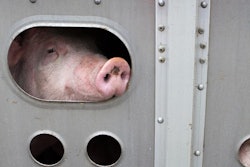
US Department of Agriculture undersecretary says the department is increasing preparedness
The U.S. is taking additional measures to control and eradicate African swine fever (ASF) if the virus ever makes its way into the country.
The U.S. has never had any confirmed cases of ASF, but U.S. Department of Agriculture (USDA) Undersecretary for Marketing and Regulatory Programs Greg Ibach said the government is increasing preparedness.
“First and foremost, USDA is committed to doing all it can to prevent ASF from entering the U.S. and we greatly appreciate the pork industry’s vigilance and partnership in this successful effort thus far,” Ibach said in a press release. “However, the additional measures I am announcing today will strengthen our ability to quickly and effectively respond to the disease if detected here at home.”
USDA said it is prepared to implement the following measures to help ensure an immediate and effective response if ASF is detected in the U.S.:
- The Agriculture Secretary would immediately take necessary steps to declare an “extraordinary emergency,” establishing USDA as the leader of a coordinated national approach to control and eradication, and ensuring the availability of funding and additional resources necessary for the response.
- USDA would issue a national standstill of at least 72 hours to prohibit all movement of swine, increasing USDA’s ability to stop disease spread and to act quickly to restore movement on a regionalized basis.
- For the depopulation of infected and exposed animals, USDA would work with states and industry to utilize the most efficient and effective depopulation methods approved by the American Veterinary Medical Association that are appropriate for the affected premises.
- To prevent virus from leaving infected premises, USDA will work proactively with industry and states to ensure producers have herd plans to deal with carcass disposal in line with regional and local requirements, supporting composting and burial in place as preferred options.
- To reduce paperwork, USDA plans to pay for virus elimination at a uniform, flat rate, based on the size of affected premises.
The announcement from USDA comes days after U.S. President Donald Trump signed into law a bipartisan bill to strengthen the country’s protections against ASF. The Protecting America’s Food and Agriculture Act of 2019 authorizes U.S. Customs and Border Protection (CBP) to hire additional inspectors, support staff and K-9 teams to fully staff America’s airports, seaports and land ports of entry.
Ibach recently said the USDA is prioritizing laboratory capability to test for ASF, and that there are now 46 laboratories across the U.S. that can test for ASF.
“That capacity allows us to test over 40,000 different samples a day, and we have very large capacity now,” Ibach said last week.
View our continuing coverage of the African swine fever outbreak.

















